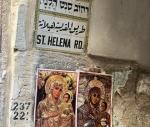You are here
Netanyahu's fate will be determined by domestic rather than foreign policies
Dec 30,2020 - Last updated at Dec 30,2020
On March 23, Israel is set to go to a fourth election in less than two years. The chief Jewish parties competing for seats in the 120-member Knesset are all right-wing. Israel's leftists have all but disappeared from the scene. The parliamentary election would have normally taken place on May 23, 2023, but the poll was put forward because the warring political factions failed to pass the state budget by the December 23rd deadline.
This will be the second election during covid and the fourth held while Prime Minister Benjamin Netanyahu is fighting for both his political life and liberty, as his trial for corruption should be underway in March, if it is not postponed again.
He has been charged with fraud, breach of trust and bribery for receiving extravagant gifts of two wealthy foreign businessman and trying to influence key media outlets to report favourably on him. If convicted, he faces jail time.
Netanyahu's fate will be determined by domestic rather than foreign policies. As the country struggles with a fresh coronavirus lockdown, he faces a fall in his popularity for failing to contain the virus, deal with the country's dire economic situation and bridge its deep political divisions.
Writing in The Times of Israel, David Horovitz explained the situation: "For the first time in Israeli history, our next election will be a battle fought overwhelmingly on the right-wing of the political spectrum.
"It will, however, have almost nothing to do with ideology. It will, rather, be all about that one man, again." Benjamin (Bibi) Netanyahu who has been prime minister for nine years, so far.
Horovitz pointed out that whoever forms the next government, this election will transform Israel as the parties of the "centre" and "left" are likely to disappear. The parties or coalitions that could win will be best at supporting the "anyone but Bibi" camp which has been demonstrating outside the prime minister's residences for months. According to opinion polls, nearly two-thirds of voters want Bibi out of office, making it more difficult than ever for him to stay on. He has to battle Naftali Bennett and hawkish Likud defector Gideon Sa'ar, neither of whom has any worries about cooperating with the ultra-Orthodox.
In the view of this writer, contrary to what Horovitz writes, Israel has long ceased to be a country where ideology matters and the parties of the "centre" and "left" command mass support. Labour, which used to be considered left-of-centre has gradually shifted right-wards, while Meretz, which remains "leftist", has been marginalised. The exception is the Joint List formed by Hadash, the leftist Palestinian-Jewish coalition, with the Palestinian Arab parties, which became the third largest faction in the Knesset with 15 seats in the 2020 election.
Polls reveal that the Likud could emerge from the coming election as the largest faction but with a reduced number of seats. This means Netanyahu, who remains Likud leader, will have to form a coalition with other parties to achieve a 61-seat majority. Netanyahu will not, however, have the backing of newcomer Benny Gantz whose Blue and White bloc fractured when he decided to form an unequal coalition with the Likud. It is predicted that Blue and White's representation could shrink to six down from 33 in the last election.
Religious and nationalist parties which have partnered Netanyahu previously have vowed not to do so again due to his unpopularity. But anything is possible in Israel where the politicians have no scruples when it comes getting into office and power.
Furthermore, Netanyahu will no longer have his White House miracle worker, Donald Trump, to back him up with political "gifts" intended to boost the Likud's standing. Trump's "gifts" included recognition of Jerusalem as Israel's capital, transfer of the US embassy from Tel Aviv to Jerusalem, acceptance of the "llegitimacy" of illegal Israeli colonisation of East Jerusalem and the West Bank, defunding of humanitarian organisations serving the Palestinians, acceptance of Israeli annexation of 30 per cent of the West Bank, and normalisation agreements with four Arab states. This long list of gifts did not save Bibi from a new contest at ballot boxes.
Trump also withdrew from the agreement providing for the reduction of Iran's nuclear programme in exchange for sanctions relief and imposed punitive sanctions on Tehran, seen by Netanyahu as Israel's main regional enemy. Their aim has been to destroy Iran's economy, oust its Shia fundamentalist government, and crush its population. But this Israeli-inspired effort has failed.
Netanyahu will have to contend with incoming President Joe Biden who is pro-Israel but not to the extent of allowing the Israeli leader to run riot in the occupied Palestinian territories and further destabilise an already deeply unstable region.
Biden has vowed to re-join the Iran nuclear deal as soon as he takes office. Iran's President Hassan Rouhani has said Iran will respond promptly by returning to full compliance with the agreement. This will involve reducing the stockpile of low-enriched uranium to limits set by the deal and warehousing disallowed advanced centrifuges. These steps can be carried out promptly while Biden will have to lift the massive tangle of sanctions imposed by Trump and his acolytes. Reversing the damage done to the Iran nuclear deal will seriously harm Netanyahu and strengthen the "oust Bibi camp".
The coming election is unlikely to fix Israel's broken political system. Its democracy has been gutted by the constant shift to the right to parties which are, at core, undemocratic and seek to impose their narrow ultra-religious and ultra-Zionist agendas on the country, Palestinian citizens of Israel, and Palestinians occupied by Israel. Netanyahu has presided over and, so far, exploited this shift to the right and could now come a cropper at the hands of even more right-wing politicians he empowered but who seek to succeed him.












